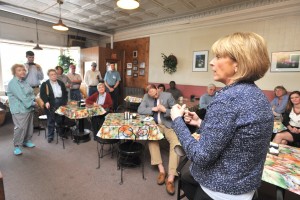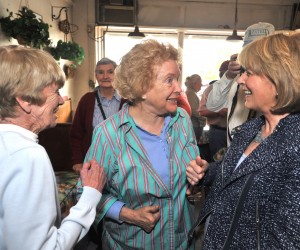
Massachusetts Attorney General Martha Coakley addresses city Democrats who gathered at Leo’s Gallery Deli Saturday morning to meet or greet the candidate seeking the Democratic party’s nomination to run for governor. (Photo by Carl E. Hartdegen)
WESTFIELD – Massachusetts Attorney General and 2014 gubernatorial hopeful Martha Coakley made the first stop of a western Mass. weekend swing Saturday at Leo’s Gallery Deli for a meet and greet prior to stops in Springfield, Holyoke, Chicopee, and Monson.
Coakley and State Treasurer Steve Grossman are considered frontrunners to win the Democratic Party’s nomination to face Republican Charlie Baker, the former CEO of Harvard Pilgrim Health and secretary to Governor William Weld, to succeed outgoing Governor Deval L. Patrick. Baker will be sharing the stage at a forum for the first time since the GOP state convention.

Massachusetts Attorney General Martha Coakley, a candidate for governor in the upcoming Democratic primary, shares a laugh with Westfield resident Carole Cummings and Norma Hill of the city’s Democratic City Committee during a campaign stop Saturday at Leo’s Gallery Deli in downtown Westfield. (Photo by Carl E. Hartdegen)
Baker and Mark Fisher are scheduled to discuss the state’s economy during today’s forum in Boston sponsored by the Massachusetts Competitive Partnership and CommonWealth Magazine.
Baker, the 2010 Republican nominee for governor, was endorsed by the party at the March convention after winning support from more than 82 percent of the delegates.
Party officials initially ruled that Fisher, a tea party member, fell just short of the 15 percent support required to continue on to the September primary. Fisher sued, claiming the party altered its own rules by counting blank ballots.
The GOP eventually agreed to certify Fisher, setting the stage for the primary contest.
Coakley, who grew up in North Adams, spoke to about 20 supporters at Leo’s, touching upon a wide array of topics, from education and the economy to working to improve the Commonwealth’s mental health services.
“We’ve got to do that last mile, to make sure that these four western counties are going to able to be fully connected. It’s going to be key to turning this economy around,” she said of improving the prevalence of Internet access. “We’ve been pushing. I know we’re not there yet, but that’s going to be a top priority for me as Governor.”
“As I look at what are six or seven or maybe more small regional economies that have a chance to grow, one of the key issues will be the appropriate development of regional infrastructure for transportation. Our hospital closed, so people have to go to Pittsfield now for anything other than emergency care.” Coakley continued, referencing the plight of North Adams Regional Hospital. “This is an issue we should see as an opportunity to invest in more transportation, to allow for inter-city and not just intra-city (transportation). That’s crucial out here.”
“People want to live outside Westfield but work here. How do we do that, while keeping in mind our goals of climate change and keeping gas and fossil (fuel) usage down?” she asked.
Coakley was also asked about the increasing prevalence of opioid addiction in western Massachusetts and how her seven-year tenure as the Commonwealth’s top law enforcement officer would equip her to continue fighting the epidemic as Governor.
“It’s ravaging here, it’s ravaging Taunton, it’s ravaging New Bedford, it is all over this state,” she said. “We saw in the mid to late ’90s an increase in the use of prescription drugs like Oxycontin, a whole population using drugs that didn’t shoot up with needles. They were, I believe, overprescribed and they became a recreational drug.”
Coakley said that the state has a “huge addiction rate” that has continued to climb, with ever newer, more dangerous drugs hitting the Bay State’s streets.
“We need to work on the regulation side, keeping those drugs out or highly regulated,” Coakley said, giving a nod to Governor Patrick’s recent attempt to ban the powerful painkiller Zohydro statewide. “We need better education with kids and parents, but we need to do more also for people who are already addicted. More beds, more emergency treatment, and better ways to get people off the addiction.”
Coakley stated that the increased use of naloxone, a nasal spray used to stop opioid overdoses widely known by the brand name Narcan, is only a short term solution.
“(Narcan) is not a longterm solution to why and how people become addicted. I don’t think we do enough research as to how we do that,” she said. “But it’s clearly reached epidemic proportions. It reaches parts of the population in Massachusetts that we never saw heroin addiction before.”
“When people run out of money to buy Oxycontin or those expensive prescriptions, they’re going to turn to heroin at $4 a bag. It is cheaper than buying a six-pack,” she said. “The legislature hears it, the Governor hears it, and we’re doing our part on the regulatory side.”

